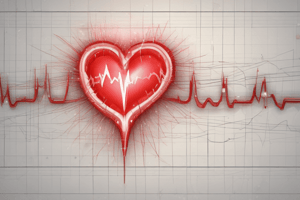Podcast
Questions and Answers
What is required to record electrical potentials generated by the current?
What is required to record electrical potentials generated by the current?
- Electrodes placed on the skin (correct)
- A single cardiac muscle fiber
- A microelectrode inserted into a ventricular muscle fiber
- A high-speed recording meter
What is the ECG composed of?
What is the ECG composed of?
- Only repolarization waves
- Both depolarization and repolarization waves (correct)
- Only depolarization waves
- Neither depolarization nor repolarization waves
What is indicated by the color red in Figure 11-2?
What is indicated by the color red in Figure 11-2?
- Complete depolarization
- Complete polarization
- Depolarization (correct)
- Repolarization
What is the stage of the muscle fiber in Figure 11-2A?
What is the stage of the muscle fiber in Figure 11-2A?
When is no potential recorded in the ECG?
When is no potential recorded in the ECG?
What is shown in Figure 11-3?
What is shown in Figure 11-3?
What is the standard representation of 10 small line divisions upward or downward in an ECG?
What is the standard representation of 10 small line divisions upward or downward in an ECG?
How much time does each 25 millimeters in the horizontal direction represent in an ECG?
How much time does each 25 millimeters in the horizontal direction represent in an ECG?
What is the typical voltage range of the QRS complex in an ECG?
What is the typical voltage range of the QRS complex in an ECG?
How is the heart rate determined from an ECG?
How is the heart rate determined from an ECG?
What is the typical voltage range of the T wave in an ECG?
What is the typical voltage range of the T wave in an ECG?
What is the typical speed at which an ECG is run?
What is the typical speed at which an ECG is run?
Flashcards are hidden until you start studying




